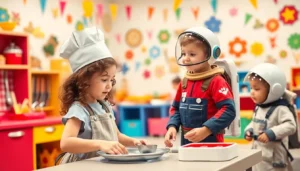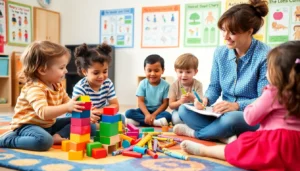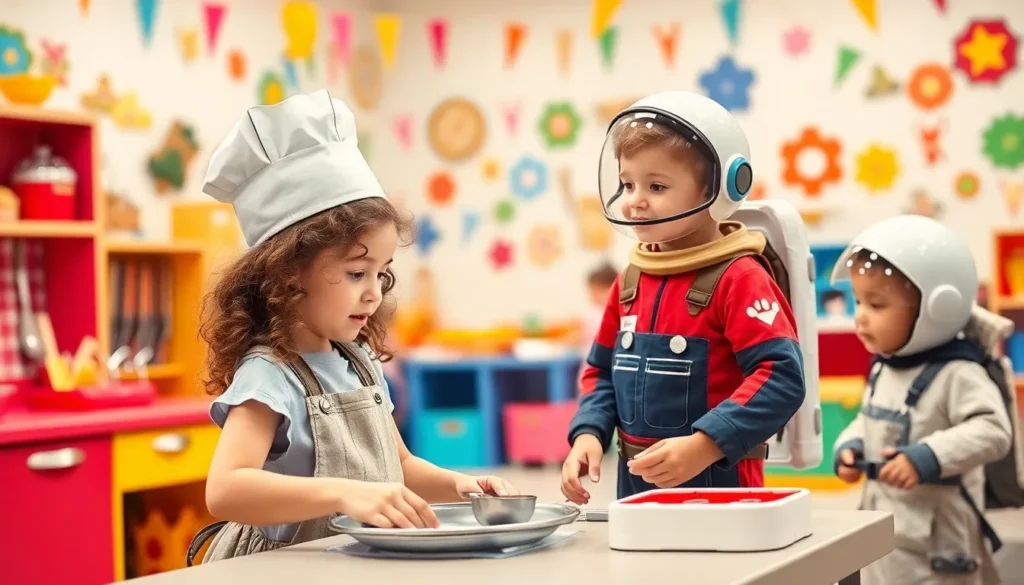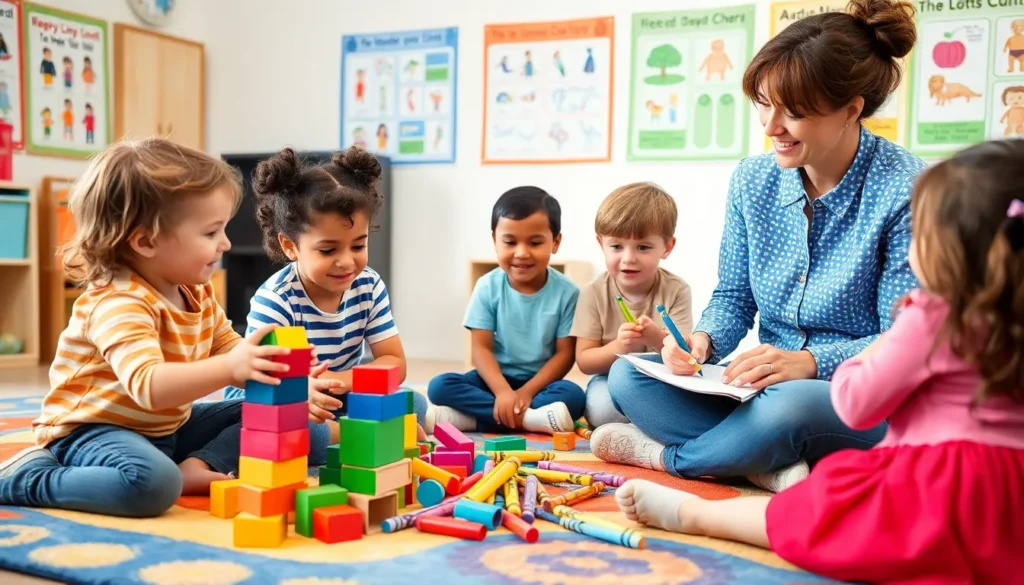Table of Contents
ToggleIn the world of early childhood education, play isn’t just a pastime—it’s a powerful tool. Imagine a classroom where children leap into learning with the same enthusiasm they show for a game of tag. Play-based learning transforms ordinary lessons into extraordinary adventures, making education feel less like a chore and more like a treasure hunt.
Research shows that when kids engage in play, they’re not just having fun; they’re developing critical skills like problem-solving, creativity, and social interaction. So why not let them learn while they laugh? By embracing play-based learning, educators can unlock a world of possibilities, turning every block tower and puppet show into stepping stones for lifelong growth. After all, who said learning can’t be a blast?
Overview of Play-Based Learning
Play-based learning serves as an essential approach in early childhood education. This method combines play activities with educational experiences, allowing children to explore concepts naturally. Engaging in play fosters intrinsic motivation, making learning enjoyable for students.
Children immerse themselves in various play activities, driving their curiosity and creativity. Such interactions enhance cognitive skills and social abilities. Collaborative play encourages teamwork, teaching kids to communicate effectively while sharing ideas.
Various types of play contribute to the learning experience. Dramatic play allows for role-playing scenarios, offering insights into real-world situations. Constructive play encourages building and problem-solving, stimulating critical thinking. Nature play promotes exploration and discovery, connecting children with their environment.
Educators benefit from implementing play-based learning by observing children’s interests and interactions. By tailoring activities to these insights, they can create meaningful experiences that resonate with students. Progress often becomes evident through informal assessments, as children demonstrate new skills during play.
Classroom environments increasingly incorporate play-based learning strategies. Integrating materials like blocks, art supplies, and sensory bins fosters exploration. These resources allow for hands-on experiences, paving the way for deeper understanding.
Overall, play-based learning proves pivotal for child development. This educational approach nurtures essential life skills while making learning an enjoyable journey. Prioritizing play in early education lays the groundwork for lifelong learning and growth.
Benefits of Play-Based Learning
Play-based learning significantly impacts early childhood education by promoting essential growth in various areas. This approach nurtures holistic development, making education enjoyable and effective.
Cognitive Development
Cognitive development flourishes through play-based learning. Children engage in hands-on activities, leading to improved problem-solving skills. Exploration fosters critical thinking abilities as children navigate challenges in playful environments. Engaging in imaginative play stimulates creativity, allowing youngsters to express ideas. Interactions with peers during play enhance language development, providing opportunities to practice communication skills. Research indicates play, particularly open-ended play, correlates with better academic performance later on. Consequently, play serves as a foundational tool for cognitive growth.
Social Skills Enhancement
Social skills receive a boost in play-based learning environments. Children collaborate while engaging in group activities, which promotes teamwork and cooperation. Sharing resources during playtime teaches valuable lessons about patience and negotiation. Role-playing scenarios enhance empathy, encouraging children to understand perspectives different from their own. Friendships often develop through these playful interactions, fostering strong social bonds. Effective communication skills emerge as children navigate group dynamics, preparing them for future collaborative experiences.
Emotional Growth
Emotional growth thrives in play-based learning settings. Children experience a range of emotions during play, helping them gain self-awareness. Through role-play, they externalize feelings, navigating various emotional experiences. Resilience builds as they encounter challenges, learning to adapt and persist. Play also provides a safe space for expressing emotions, which can lead to improved emotional regulation. Stronger self-esteem often results from their accomplishments in playful scenarios. Holistically, play nurtures emotional intelligence and equips children to handle life’s complexities.
Key Components of Play-Based Learning
Play-based learning encompasses various elements vital for fostering optimal development in early childhood education. These components facilitate exploration and growth through engaging experiences.
Structured Vs. Unstructured Play
Structured play involves guided activities with specific goals, promoting particular skills and outcomes. Teachers often facilitate these experiences to ensure children develop essential competencies. Unstructured play, on the other hand, allows children to explore freely, encouraging creativity and self-discovery. This type of play fosters imagination and problem-solving abilities, as it empowers children to create their own rules. Both forms play significant roles in holistic development, with structured play providing foundational skills and unstructured play enhancing personal growth.
Role of Educators
Educators serve as facilitators in a play-based learning environment, observing and responding to children’s interests. They create an environment that encourages exploration and interaction among peers. By selecting relevant materials and activities, teachers enhance engagement while ensuring educational objectives are met. They guide children in their play, promoting teamwork and social skills. Educators also assess children’s development through observation, allowing them to tailor future activities that address specific needs. Their active involvement ensures children maximize learning while enjoying the play experience.
Challenges in Implementing Play-Based Learning
Implementing play-based learning in early childhood education presents several challenges that educators must navigate.
Resistance from Traditional Methods
Resistance towards play-based learning often stems from a reliance on traditional teaching methods. Many educators and parents value structured lessons over unstructured play, fearing it lacks educational rigor. This mindset can create obstacles, making it difficult to integrate play into daily routines. Teachers may struggle to balance play with curriculum goals, leading to concerns about meeting educational standards. Shifting perspectives requires ongoing professional development and advocacy. Training sessions can equip educators with the tools necessary to embrace play as a legitimate teaching strategy. Encouraging collaboration among staff also fosters understanding of play’s benefits, easing resistance.
Resource Limitations
Resource limitations pose significant challenges to effective play-based learning. Classrooms often lack sufficient materials to support diverse play activities. Budget constraints can limit access to educational toys, art supplies, and outdoor play environments. Schools might not prioritize funding for resources needed for play-based strategies. Teachers often resort to improvisation, which may not provide optimal learning conditions. Seeking community partnerships can enhance resource availability, providing additional materials and support. Grants and fundraising also play vital roles in overcoming financial hurdles. Prioritizing investment in play-based resources ultimately strengthens children’s development.
Future of Play-Based Learning
Play-based learning continues to evolve, reflecting the changing needs of children and educators. Educators increasingly recognize its importance in fostering engaging learning environments. This approach enhances creativity, critical thinking, and social skills while promoting holistic development.
More schools are integrating play-based strategies into curricula. Research indicates that play positively impacts academic performance. Children performing play-based activities often exhibit better problem-solving abilities and improved language skills.
Emerging technologies offer new opportunities for play-based learning. Interactive tools and digital platforms encourage collaborative play, bridging traditional and modern learning experiences. These resources allow children to engage with educational content in innovative ways.
Educators play a crucial role in shaping the future of this learning method. By staying informed about effective practices, they can adapt lessons to meet children’s evolving interests and needs. Collaborating with families and communities strengthens the play-based learning framework.
Conversations about the benefits of play will likely influence educational policies. Advocacy for play-based learning can lead to increased funding and support for necessary resources. Communities understand the value of investing in children’s learning experiences, fostering environments that prioritize exploration and creativity.
Overall, the future of play-based learning promises to enhance early childhood education. Emphasis on this approach will nurture essential life skills while accommodating the diverse needs of young learners.
Play-based learning is crucial for fostering holistic development in young children. It encourages creativity problem-solving and social skills while making education enjoyable. By integrating play into early childhood education, educators can create dynamic environments that resonate with children’s natural curiosity.
As the landscape of education evolves it’s essential to advocate for play-based approaches that prioritize children’s needs. Investing in resources and training for educators will enhance the effectiveness of play-based learning. This commitment not only nurtures essential life skills but also lays a strong foundation for lifelong learning and growth. Embracing play as a vital educational tool will ultimately shape a brighter future for young learners.










